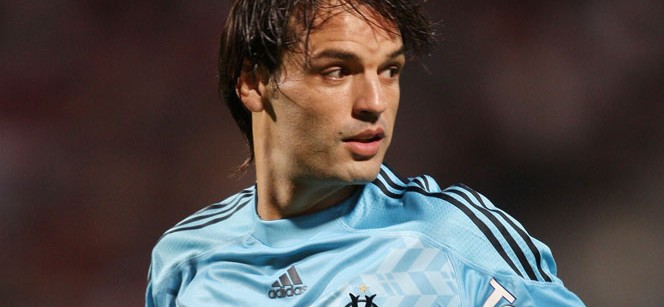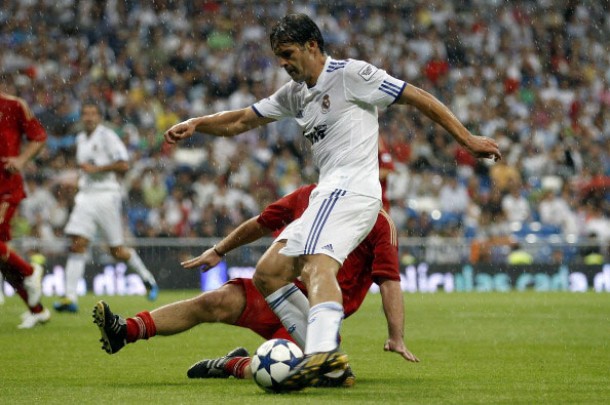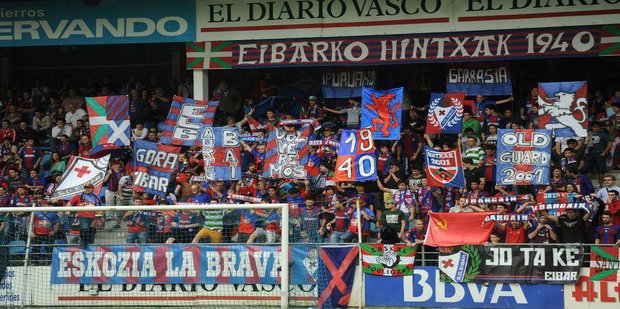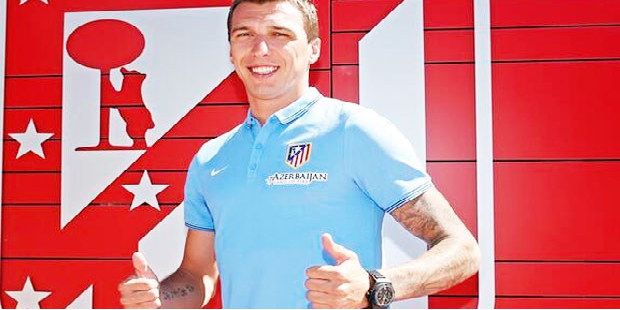- S.D. Eibar ready for maiden La Liga outing
- SD Eibar stengthen ahead of debut La Liga season
- Can ‘Super Mario’ live up to expectations in Madrid?
- MAN IN THE GROUND – Brentford 0 – 4 Osasuna
- Historic Basque derby welcomes S.D. Eibar to La Liga
- Munich to Madrid, via Brazil – Tony Kroos
- Rakitic in Spanish Switch
- Can Spain find redemption in Rio?
- Viva Espana! A season of redemption for Spanish football
- From the old to the new: who can fill the void in years to come for La Roja?
King Fernando – The life and times of a modern Spanish great
- Updated: 8 August, 2012

 Almost 20 years ago a fresh faced 17-year-old by the name of Fernando Morientes Sanchez came on to make his debut for Albacete at home to Tenerife. Not many could have foreseen the career this bright young centre forward was about to embark on.
Almost 20 years ago a fresh faced 17-year-old by the name of Fernando Morientes Sanchez came on to make his debut for Albacete at home to Tenerife. Not many could have foreseen the career this bright young centre forward was about to embark on.
Albacete were not a competitive team and during Morientes’ time there, battled against relegation – ultimately succumbing the season after his departure. It became clear after five goals in 20 games during his second season at the struggling club that Morientes was destined for better things, this came in the form of a transfer to top ten side Real Zaragoza.
Morientes flourished in Aragon, and at the age of just 19 he fired in 13 La Liga goals – over a fifth of Zaragoza’s total goals that season. His record got even better next campaign, this time hitting 15, big clubs began to take note of the now proven goalscorer.
Unsurprisingly, given his performances, the young starlet was signed by then champions Real Madrid. The 1996/97 season had been one of the closest on record with the side from the capital edging it over Barcelona by just two points. Barca had in fact won more games and scored a lot more goals than their rivals, but eight losses proved key in their unsuccessful efforts to claim the title. New Real Madrid coach Jupp Heynckes had been impressed by the young Spaniard’s displays at Zaragoza where he averaged just under a goal every two games – ultimately persuading the clubs board to bring him to the Bernabeu.
Morientes had mixed fortunes in his first season in Madrid however. The club struggled in the league and only managed a lowly fourth placed finish – over ten points behind rivals Barcelona. Nonetheless, despite being seen as a back-up to strikers Mijatovic, Suker and Raul the new-signing managed to outscore them netting 12 La Liga goals.
Madrid’s league form was in stark contrast to their European performances as the club lifted their first European Cup since 1966. Morientes was an integral part of the European run scoring twice in the group stage and twice more in the knockout rounds to finish as Real Madrid’s top scorer in the competition.
The balance of power truly shifted that season, with the strike trio of Raul, Suker and Mijatovic that had looked unbeatable during the 1996-97 season beginning to crack as Morientes forced his way into the side. Benefiting from injuries to Mijatovic and the inconsistent form of Suker, Morientes appeared in 33 league games.
This power shift continued in the following season under new boss Camacho. Morientes and Raul became the preferred strike pairing and netted 44 goals between them, the deadliest partnership in La Liga. That said, Madrid still finished over ten points behind champions Barcelona despite changing coach three times during the season.
The season of 1999-2000 proved very similar to that of 1997-98 as Real Madrid struggled to perform in the league, although Morientes and Raul continued to prove prolific. The league was particularly tight with eight points separating the top six, Real eventually finishing fifth. Somehow, and despite the struggles, Madrid again managed to triumph in Europe, comprehensively defeating Valencia 3-0 in the final with Morientes scoring the all important first goal.
That season also saw him make the international break-through and he repaid the call up with a brace in a friendly against Switzerland on his debut. In fact, he had a remarkable start to his international career, scoring six times in his first three games for Spain. Morientes went on to appear at two world cups with the Spanish squad scoring five goals in total.
The 2000/01 season saw Morientes pick up his first La Liga winners medal, although his campaign was hampered by injury – only making 22 appearances. Madrid relied heavily on his strike partner Raul to fire in the goals and he delivered, finishing with 24 goals and claiming the Pichichi.
Morientes put his injury woes behind him to bounce back in fine style next campaign, scoring a magnificent and career second highest season return of 18 goals. However, the club finished in a disappointing third place as Valencia took the league by storm. The season would also prove to be a turning point in Morientes’ career in the capital as the Galactico era dawned at the Bernabeu.
The arrival of Brazilian star Ronaldo in 2002, lead many to believe Morientes would leave the club, however, he stayed to fight for his place. Unfortunately he was fighting a losing battle and his playing time decreased dramatically – Morientes still managed to score five league goals as the club won the La Liga title however.
It soon became clear that the forward did not feature in coach Vicente Del Bosque’s first team plans and so moved on loan to French side AS Monaco in search of regular first team football. Ironically, this lead to arguably Morientes’ most impressive season of his career. The 27-year-old Spaniard still had much to give and he lead the French outfit to an unlikely Uefa Champions League final – dramatically helping dispatching his parent club in the semi finals after scoring in both legs.
Monaco were beaten 3-0 by Porto in the Gelsenkirchen finale, however, to reach the tournament showpiece in itself was astounding achievement. Morientes also finished top scorer in the competitionthats season with nine goals in twelve appearances.
On his returned to the Bernabeu, Morientes found Madrid had invested in another high-profile striker, the young English star Michael Owen. It was clear that whatever Morientes did he was surplus to requirements. He soldiered on but by January had not scored or started a game. Many teams came calling for the player but he chose to move to England and joined Liverpool.
On his departure Morientes had nothing but praise for Real Madrid, a club he had grown to love, however, he lamented his last few months at the Bernabeu and sought to put them behind him.
There was great buzz in England over his move to Liverpool, however, the great man struggled to make an impact. That said, when he left at the end of 2006 he took with him an FA Cup winners medal and had he not been cup-tied, would have also been part of the Champions League winning side of 2005.
A new start at Valencia saw Morientes link up with Spanish star David Villa and the experienced and much-travelled striker rediscovered his form. He averaged a goal every two games for los Che as Valencia finished a more-than respectable fourth. His form was so impressive in fact, that he managed to force his way back into the national side.
As Morientes past his 30th birthday, he began to spend more and more time on the bench and goals began to elude him. His subsequent Valencia career failed to match his first season at the Mestalla and he spent one final season at Marseille in France before hanging up his boots at the end of 2010. Marseille won the league and cup that season, although the Spaniard was very much a fringe player.
Morientes was never the goal scorer that Raul was, but their link up play was fantastic at times. It is testament to him that his best goal ratios were at the most competitive of levels – Champions League and International football.
Now working within the Real Madrid youth system, Fernando Morientes can look back on a career which spanned almost two decades and saw him win three Champions League titles, two La Liga titles, one FA Cup, one French title, one French cup, and a Copa del Rey. He remains the fifth highest Spanish international goalscorer of all time and has to be regarded as one of the true modern greats of Spanish football.
Follow @icentrocampista






One Comment
You must be logged in to post a comment Login